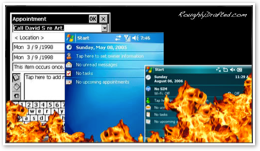


After earlier blowing apart iPhone battery panic with an announcement of 8 hours of talk time, Apple dropped yet another bombshell upon “business as usual” in the mobile market. In addition to simplified calling plans that start well under what had been predicted, the company also unveiled home activation.
Rather than dealing with an extended sign up session in a mobile retail store, iPhone buyers will simply take home a retail package and use iTunes to set up their account. No need to spend an hour in the store setting up a new phone with a salesman.
It won't be any more complicated than selling an iPod. The worries that Apple would get bogged down trying to register all of the quarter million or so customers trying to buy an iPhone on opening weekend turned out to be premature.
Back in January, I raked Microsoft CEO Steve Ballmer over the coals for announcing in a TV interview that the iPhone was “the most expensive phone in the world.” His own HTC Windows Mobile phones are $900.
Of course, he compared the $500 iPhone to the simple Motorola Q, which was on sale for $99. What he didn't say was that the Q was only offered at that price when users signed up for an $80/month contract over two years, a $1920 commitment.
Assuming the same voice and data plan for the iPhone, I stated that the real difference price between the Q and the iPhone was only a 20% premium: $15/month extra to have an iPhone over a Motorola Q from Verizon.
Motorola Q: $99 with mail-in rebates + basic $80 service plan = $2019 across two years, or $85/month.
Apple iPhone: $499 + basic $80 service plan = $2419 across two years, or $100/month.
With the new plans announced by Apple and AT&T, that has changed. The minimum plan with unlimited data is $59, or $1416 over two years. That makes the iPhone over a hundred dollars less than Verizon’s limp Motorola Q.
When I checked on Verizon’s website, I found the Motorola Q was now being offered for $150, not the special $99 Ballmer-on-TV sale price that was only good six months ago. That makes the anemic Windows Mobile Q over $200 more than the iPhone! The Q already has suffered disappointing sales, so this won’t help.
If the simplistic, cheapo Motorola Q costs more than the iPod-and-web browser iPhone with its visual voicemail and wizzy Google Maps, then how will the expensive phones fare?

What were all the mobile executives saying about Apple not knowing how to build or sell a phone? Sounds like they’re all getting owned in a very large way. It wouldn’t be so fun to laugh at the situation if Palm, Microsoft, Motorola, Verizon and the rest hadn’t all been offering us such a bad combination of products and service.
With Great Power Comes Great Responsibility.
As if from a teary scene from SpiderMan, Apple has used its superpowered iPhone media sensation as leverage to force mobile service prices lower and make service simple. Can you imagine that the rest of the mobile industry won’t be forced to sheepishly tag along? How will Verizon sell any pitiful Windows Mobile Motorola Qs at any price now?
There is also no question of whether the iPhone can be obtained without a contract. The only question will be how soon crackers can figure out how to open it up for use on foreign GSM networks. It's not an upfront subsidized phone (more on that later), so there's no ethical quandary involved either. That’s good for consumers.
It’s also good for Apple as it sells more iPhones. It's even good for AT&T because it makes it more attractive and promotes it as a progressive company in an industry where all the huge service providers are commonly characterized as greedy dinosaurs. AT&T is going to suck up a lot of Verizon’s most valuable customers.
This All Happened Before.
This all feels a lot like iTunes and the music industry. Apple entered a business polarized between the RIAA labels trying to sue their own customers, and customers ready to rip off musicians in revenge. Microsoft had only offered technology for greater policing of media. We don’t need a police state, we need education and leadership.
Apple brought in a respect for artists and established a compromise among the labels: offer more freedom in music and enjoy a increase in sales at a fair price that will bring back customers. Microsoft's PlaysForSure prisons did nothing to make up for drooping music sales, while iTunes changed the game.
The iPhone will do the same in the mobile space: bring real innovation at consumer prices, upgrade expectations across the industry, and make everything simpler.

Like reading RoughlyDrafted? Share articles with your friends, link from your blog, and subscribe to my podcast!
Did I miss any details?

Haloscan Q107
 Bookmark on Del.icio.us |
Bookmark on Del.icio.us |  Discuss on Reddit |
Discuss on Reddit |
 Critically review on NewsTrust
Critically review on NewsTrust
 Forward to Friends |
Forward to Friends | 
 Get RSS Feed |
Get RSS Feed |
 Download RSS Widget
Download RSS Widget
Check out the Daily Show Multi-Pass on iTunes.com

Next Articles:
Does Leopard Look Like Vista?
BHOze and the BHOzing BHOzers that BHOze Them.
EA’s Intel Mac Games: WINE and Cheese?
This Series
Apple: iPhone Now Costs Less than Ballmer's Lame Motorola Q
Tuesday, June 26, 2007

Ad












